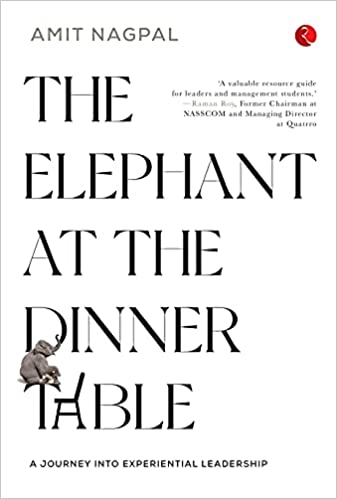At the beginning of the book, The Elephant at the Dinner Table (Rupa Publications), author Amit Nagpal poses a valid question: “Many people rise to the top in their profession, organization or department, company, and maybe, their community. But do they really know how to lead?”. It is on this poignant base that the book on experiential leadership takes off. After all, nothing teaches more or better than experience. Targeted at mid-level and aspiring leaders, and based on the rich tapestry of experience that Nagpal himself has in leadership positions and training activities, the book also benefits from sound research validation.
There are many nuggets and concepts that will stand out as you read The Elephant at the Dinner Table. You will find an easy conversational tone, making you feel as if you are chatting with the author himself. Sometimes you may find conceptual clarity, such as, how emotional intelligence and emotional literacy are different and how one can harness this awareness in becoming a better leader who is in touch with her team. Perhaps the most obvious and yet elusive concept that he deeply stresses on is how a leader must have self-awareness and self-regulation.
Sometimes you will find an actionable trick that will change things round! For instance, one of the chapters mentions ‘outwork’, a system where any two coworkers having an issue were encouraged to go ‘out’ at a neutral place such as a café or restaurant, talk things over, and then involve the superiors if the issue was still unresolved. The result of this simple policy was mind-blowing. Upward delegation of these ‘issues’ were drastically reduced thus saving time and also encouraging employees to discuss matters and thrash them out in a respectful manner.
Another chapter has tips on how leaders can garner feedback from ‘mirror-holders’ to paint a clear picture of one’s strengths and then leverage the same to further one’s career. Or, how establishing ‘learning circles’ is a good way of ensuring that the leader is constantly apace with the changes happening in the world.
Experiential leadership
Experiential leadership is indeed at the core of this book. Through insights from the author’s own career, and of careers of people he has observed and mentored there will surely be a strand of thought that will resonate with you. One insight I found interesting was how there is a lot of focus on one’s weakness and how one can develop in areas we lack. While there is no denying that we all could do with some training to fill the gaps, the author also raises the valid question- what about our strengths? Don’t we also need to capitalize on them. “Know your strengths and be proud of them. At the same time chase your dreams using your strengths as a fulcrum,” he writes.
Since this book is centered around experiential learning, one of the more relevant chapters was the one in which the author discusses mistakes. It does take courage to acknowledge mistakes that one has made. But, his knack of eliciting learnings from these mistakes is inspirational in itself!

It is a delightful concoction of a few things: Research interviews with 300 leaders worldwide, storytelling that drives home the point made, a distillation of common themes that will help leaders up their game, detailed and well-done illustrations that promote clarity as you read, exercises at the end of each section to recall and reflect upon the content, and then apply it to your unique situation.
Some takeaways
- A Growth Mindset is essential to develop our emotional intelligence or leadership skills or to adapt to new technologies. The Growth Mindset works best when adapting to a new reality that may emerge after a crisis. I know of many people who try to reconstruct the past and continue to stay fixed in past habits.
- Developing and nurturing a circle of people whose advice you can rely on is crucial. Believing that you know it all or can do it all is a sure path to failure.
- Finding someone highly qualified in your field, well respected in your organization and willing to offer you assistance and guidance can be one of the most critical actions you can take to be a successful leader. And it is a step often overlooked by many aspiring leaders.
- All aspects of leadership can be traced back to good communication. The capacity to inspire and influence, create alignments and navigate tricky dynamics requires a leader to communicate well. Communication is not limited to language skills; it includes the personal presence and impact that a leader makes. Do they only use words, or do they have a powerful voice with which they command our attention?
- Reverse mentoring and peer mentoring are helpful strategies that a leader can use. Use the team as a sounding board.
- Know your strengths and be proud of them. At the same time chase your dreams using your strengths as a fulcrum.
- Mistakes that new leaders make stem from several reasons, such as a need to be liked, impulsive decision making or short-sightedness instead of long-term thinking. This can result in difficulties in giving direct feedback, addressing symptoms rather than seeking causes or forgetting to communicate the organisational vision.
- It is said that leaders need ‘followers’. The term is a misnomer. Leaders really need co-creators of solutions, working side-by-side and using their own talents and skills to help the leader accomplish the team’s shared goals and vision. For many leaders, the concept of ‘different but equal’ is a hard one to accept.
- As human beings, we have a profound psychological hunger for social stimulus, contact and recognition. When leaders can meet that need with authenticity and sincerity, the people who work with them feel deeply seen, understood and engaged.
- At the end of the day, your team members will always remember how you made them feel.
- It is important for a leader to adapt to new situation as well as observe, learn and understand the rules of a continually changing game and excel at it.
That’s a bit of experiential leadership for you. Another parting shot- when you sit down to read The Elephant at the Dinner Table do grab a notepad and be ready for some deep diving into yourself. It is a book that is great reading material, but one that encourages you to think about what you’ve read!




